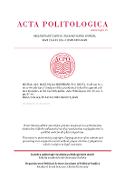‚I will not be a mere wreath layer!‘ Analysis of the presidential refusal to appoint cabinet ministers in the Czech Republic

Publication date
2023Published in
Acta PolitologicaVolume / Issue
2023 (15)ISBN / ISSN
ISSN: 1804-1302Metadata
Show full item recordCollections
This publication has a published version with DOI 10.14712/1803-8220/15_2023
Abstract
The discrepancy between the constitutionally defined and actual exercise of the power ofstate institutions has been widely discussed within European political science. The adop- tion of direct presidential elections in the Czech Republic, where the law entered into forcein 2012, and the associated shift towards a more powerful presidency has also promptedmuch debate. The sovereign perception of the mandate of the first directly elected president,Miloš Zeman, intensified academic discussions about the implications of a change in regimetype (from a parliamentary one towards a de facto semi-presidential one). While scholarshave differing views on this matter, only a few academic articles have focused on the cru- cial aspects of presidential power, with most rather assessing the overall regime characterinstead. This paper views the appointment of cabinet members as an essential non-sharedpresidential power, emphasizing interactions among actors in the political system. A com- parative case study enables us to explore situations where three Czech presidents adoptedauthoritative approaches in exercising their powers. We present a new dataset that usesqualitative analysis to examine incidences when a president delayed the process of appointing cabinet members, representing a deviation from the praxis of cabinet domination in aparliamentary regime. Comparing the three Czech presidents - two elected indirectly andone directly elected - enables us to assess the impact of the popular vote in this regard.Focusing on a temporal dimension allows for comparison of the periods of delay betweena publicly declared effort to reject candidates till the moment of their appointments (orwithdrawal). The key findings consist of the significant difference between indirectly electedpresidents and their directly elected counterparts in appointing cabinet members. The paper contributes to the debate about the discrepancy between constitutionally defined powers, their exercising in reality, and a shift from parliamentarism to semi-presidentialism.
Keywords
President of the Czech Republic, presidential powers, cabinet appointments, Czech Constitution, semi-presidentialism, parliamentarism
Permanent link
https://hdl.handle.net/20.500.14178/2097License
Full text of this result is licensed under: Creative Commons Uveďte původ 4.0 International


